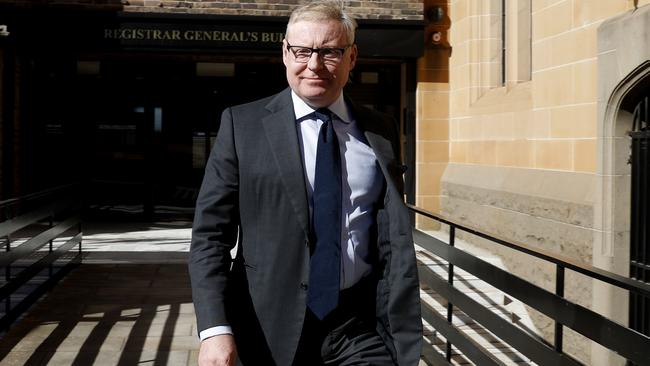Coronavirus Australia: Some, such as Ruby Princess’s colourful counsel, like it hot on social media
Senior counsel in Ruby Princess inquiry accused commonwealth of mismanaging pandemic in social media comments.

The senior lawyer who raised the spectre of contempt charges against The Australian for its coverage of the Ruby Princess inquiry is a frequent critic of the federal government who has published comments on social media accusing the commonwealth of mismanaging both the pandemic and the cruise ship fiasco.
Just weeks before the commission began, Richard Beasley SC — the senior counsel assisting at the Ruby Princess inquiry — retweeted a post by Crikey website journalist Bernard Keane accusing the Home Affairs Department of “incompetence” and saying it had a long history of bungling matters of national security.
That tweet is one of several by Mr Beasley where he liked or retweeted posts attacking the Morrison government over private school funding during the pandemic and others stating the lockdown was being exacerbated by the cruelty of capitalism.
Mr Beasley uses his Twitter account to publish official Ruby Princess inquiry material and alerts, and promote his books, indicating he considers it a professional feed.
The Australian is not suggesting that Mr Beasley’s personal views compromise his independence nor that of the commission.
However, they do suggest that he is personally critical of the role that Home Affairs played in its handling of the saga — a key line of inquiry for the commission. Mr Beasley dismissed any suggestion of impropriety regarding his social media activity, saying his retweets did not necessarily reflect his own personal views and that any opinions he held about the handling of the Ruby Princess disaster leading into the special commission of inquiry were “uneducated”.
“My retweets are not endorsements,” he told The Australian. “The (Crikey) retweet was just passing on Bernard’s views.
“Of course, once you start an inquiry like this (into the Ruby Princess) you wouldn’t go anywhere near a tweet like that.
“But this was on March 26, before the inquiry began. I can’t see anything wrong with retweeting his views back then.
“If it was my own personal view, I would have sent out my own tweet. I am not shy about sharing my opinions.”
Mr Beasley has certainly made no secret of his politics. In an interview last year, he claimed to have been influenced by Che Guevara because: “He really knew how to ensure a just, quick and cheap trial for right-wingers, well before section 56 of the Civil Procedure Act” — a provision that declares this to be the overriding purpose of civil litigation.
In the same interview, he said his favourite film was Some Like it Hot because it was the first film that dealt with cross-dressing, sexism “and the LNP’s attitude to climate change”.
He told the legal website Justinian that if he were on death row he would ask for his last meal to consist of “Barnaby Joyce’s testicles”. And when asked on February 6 last year, three months before Scott Morrison’s election victory on May 18, what he would change about Australia, he replied: “The Prime Minister. Weekly. Until we get the right one.”
The conduct of barristers on social media is governed by guidelines that were issued by the NSW Bar Association to help its members avoid breaches of barristers’ rule 8.
That rule precludes conduct likely to diminish public confidence in the legal profession and the administration of justice.
An example of conduct that would breach rule 8 is use of social media that “appears to or does express the opinion of a barrister on the merits of a current or potential proceeding or on any issue arising in such a proceeding, other than in the course of genuine educational or academic discussion on matters of law”.
There is no suggestion that Mr Beasley’s activity on Twitter breached rule 8.
For the next few months, Mr Beasley’s role as senior counsel assisting requires him to help commissioner Bret Walker SC make an independent assessment of the policies and procedures of the NSW and federal governments in relation to this affair.
After conducting initial interviews with key witnesses, the commission is now reviewing a trove of documents before it reconvenes, with an estimated start date of June 8.
“Then we will be continually in public hearings for the next month, which would mean we will have heard most of the evidence by the start of July,’’ Mr Beasley said. “There are still a number of expert people we need to hear from. We will also be hearing from passengers. Obviously we won’t be calling on all 2700 of them but there will be some.”
In August, when Mr Walker is due to report, the nation will learn who the commissioner believes was responsible for allowing infected passengers to leave the cruise ship in Sydney and spread death and disease.
That report, produced with Mr Beasley’s help, has the potential to terminate careers and dominate state and federal politics.
Mr Beasley emphasised the inquiry’s independence on May 8 while delivering a blistering attack on this newspaper over a commentary by David Penberthy that said it was “a taxpayer-funded show trial aimed at achieving a political end”.
Mr Beasley told Mr Walker the inquiry was “completely independent of government”, with terms of reference that were not directed to any particular outcome.
The commission’s senior solicitor invited The Australian to provide information to be considered “as to whether the comments in Mr Penberthy’s article … might constitute a contempt”.
On May 13, lawyers acting for News Corp Australia, publisher of this newspaper, told Mr Walker The Australian apologised unreservedly. Penberthy’s article had not been intended to be critical of the inquiry, the commissioner or commission staff. It had been intended to be a discussion of political matters, Mr Walker was told.
The independence of the inquiry is critical, and is implicit in the letters patent issued by NSW Governor Margaret Beazley on April 15. As well as Princess Cruises’ conduct, the inquiry is required to assess the communications between agencies of the NSW and federal governments, and the actions of both governments.
While the commission was established by NSW, the letters patent empower it to examine and report on the policies and protocols used by both governments to manage suspected cases of COVID-19. One of the agencies singled out in the letters patent is the Australian Border Force, a federal agency that is part of the Department of Home Affairs.
It is this agency that was at the core of Keane’s assessment of the Ruby Princess affair retweeted by Mr Beasley of March 26.
It said in part: “The incompetence of Home Affairs has long been a threat to national security.”
Keane’s comments were made in reference to a video clip posted by former journalist Sally Prosser showing crowds of travellers contravening social-distancing requirements while queuing at immigration at Sydney International Airport, claiming: “When @AusBorderForce was asked wtf re #SocialDistancing the reply was ‘not our problem, that’s biosecurity’.”
Keane added: “Same logic behind waving Ruby Princess disease carriers into Sydney without even checking their passports.”
However, Mr Beasley said he was “more interested in what was happening at the airport” than the reference to the Ruby Princess.
On April 5, just 10 days before the letters patent were signed, Mr Beasley tweeted a link to an article about left-wing thinker Noam Chomsky and wrote: “Chomsky: Ventilator shortage exposes the cruelty of neoliberal capitalism.”
On April 29, he retweeted an assertion by retired broadcaster Mike Carlton who said it was bizarre that state schools were struggling to obtain hand sanitiser and clean toilets while private schools had received billions of dollars.
That day he also retweeted an assessment from the ABC’s Norman Swan that said: “The hotspots appear to map to (sic) the entitled.”
Mr Beasley is no newcomer to commissions of inquiry. He was senior counsel assisting at the Murray-Darling Basin royal commission and has been commissioner at local government commissions of inquiry for the NSW government. Counsels assisting are usually appointed by the commissioner, in consultation with the government calling the inquiry.
When Mr Beasley was asked last year to name the person he most admired professionally, he nominated Mr Walker.






